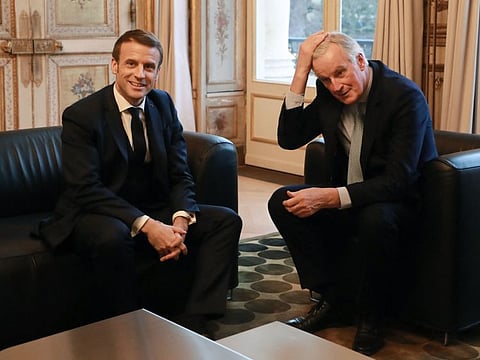Macron names ex-Brexit negotiator Barnier as French PM
Barnier, oldest premier in history of modern France tasked with forming a unifying govt

PARIS: French President Emmanuel Macron on Thursday named the European Union’s former Brexit negotiator Michel Barnier as new prime minister, following almost two months of political deadlock after snap polls, the presidency said.
Barnier, 73, the oldest premier in the history of modern France, has been tasked with forming “a unifying government in the service of the country”, it said.
Since Wednesday, politicians and media in France had raised expectations that a new head of government would finally be announced to succeed Gabriel Attal, after the elections in July resulted in a hung parliament.
A left-wing coalition emerged as France’s biggest political force but with not enough seats for an overall majority. Macron’s centrist faction and the far right make up the two other major groups in the National Assembly.
Conservative ex-minister Xavier Bertrand and former Socialist prime minister Bernard Cazeneuve had been seen as the initial favourites.
But both figures fell by the wayside with the mathematics of France’s new parliament stacked against them.
In France, the president names the prime minster, who can then be censured by parliament.
Both Bertrand and Cazeneuve risked facing a no-confidence motion that could garner support from both the left bloc and the far right.
Barnier, a right-winger and the European Union’s former negotiator on Brexit, was seen emerging from talks at the Elysee with Macron to make a return to frontline politics as premier.
He has been all but invisible in French political life since failing to win his Republicans (LR) party’s nomination to challenge Macron for the presidency in 2022.
The veteran former foreign minister and EU commissioner is “Macron-compatible” and would not be immediately voted out by parliament, an advisor to the president told AFP, asking not to be named.
A minister in the outgoing government, who also asked not to be named, said he was “very popular with right-wing members of parliament without being an irritant on the left”.
‘Marine Le Pen decides’
Macron appears to be counting on the far-right National Rally (RN) of three-time presidential candidate Marine Le Pen not to block the appointment of Barnier.
The party’s deputy leader Sebastien Chenu, speaking to BFM TV, appeared to indicate the RN would not automatically back a vote of no confidence against Barnier, as it would for Bertrand and Cazeneuve.
RN party leader Jordan Bardella said Barnier would be judged “on evidence” when he addresses parliament.
Greens leader Marine Tondelier countered: “We know in the end who decides. Her name is Marine Le Pen. She is the one to whom Macron has decided to submit.”
Macron’s decision comes under the gun of a deadline to submit a draft 2025 budget for France’s strained government finances before October 1.
It also marks his attempt to acknowledge rejection of his seven-year rule without giving up on hard-fought reforms, chief among them last year’s widely resented increase to the official retirement age to 64 from 62.
After the July election deprived Macron of his relative majority in parliament, the centrist president has drawn out the appointment of a new prime minister for a period unprecedented since World War II, through the July-August Olympic Games and beyond.
Throughout the chaos, Attal, who made history this year as France’s youngest and first openly gay head of government, has stayed in office as a caretaker.
Speaking to Le Figaro daily and using rugby parlance, he expressed hope his successor could “convert the try” of the policies whose implementation he could not complete.
Sign up for the Daily Briefing
Get the latest news and updates straight to your inbox



